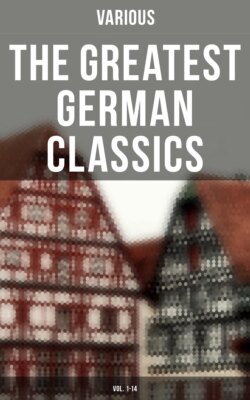Читать книгу The Greatest German Classics (Vol. 1-14) - Various - Страница 1487
На сайте Литреса книга снята с продажи.
THE ANTIQUE
ОглавлениеTable of Contents
Man can accomplish much by the opportune use of individual powers, he can even accomplish extraordinary things by the combination of several powers; but the unique, the startling, he can only achieve when all capabilities are evenly united in him. This last was the happy lot of the ancients, especially of the Greeks in their best period; to the other two alternatives we moderns are unfortunately limited by fate.
When the healthy nature of man acts as a unit, when he realizes his place in the world as part of a great and worthy whole, when a harmonious well-being accords him a pure and free happiness—then the universe, if it had the power of self-realization, its end attained, would rejoice and admire this culmination of its own genesis and existence. For to what purpose is the array of suns, planets and moons, of stars and milky ways, of comets and nebulae, of worlds existing and arising, if it be not that a happy man may unconsciously rejoice in his own existence?
While, in almost every act of contemplation, the modern thinker, as we have just done, projects himself into the infinite, to return only in the end—if he is happy enough in succeeding therein—to a limited proposition, the ancients, without following a long, round-about path, found their exclusive happiness within the lovely confines of this world. Here they were placed, to this end they had been called, here their activity found its field, their passion its object and nourishment.
Why are their poets and historians the wonder of the judicious, the despair of rivals, unless it be because the actors introduced by them were so deeply concerned in their own selves, in the narrow circle of the fatherland, within the circumscribed path of their own life as well as that of their fellow citizens, and because with all their mind, inclination, and power, they worked in and for the present? Under such conditions it could not be difficult for a writer of their opinion to immortalize such a present. What was actually occurring was for them the only thing of value, just as for us only what is thought or felt seems of greatest worth.
In a certain sense the poet lived in his imagination, just as the historian lived in the political, and the investigator in the natural world. All held fast to the nearest, the true, the actual, and even the pictures of their fantasy have bone and marrow. Man, and whatever was human, was considered of the highest value, and all his inner and external relations to the world were represented with the same great intelligence with which they were observed. Feeling and observation had not been separated; that almost incurable breach in the healthy power of man had not yet occurred.
Not only in enjoying happiness, but in enduring unhappiness also, these natures were remarkably gifted. For as a healthy tissue resists illness and is speedily restored after every attack, so the wholesome mind of such natures quickly and easily recovers from internal and external misfortune. Such an antique nature, in so far as one can make this statement of any of our contemporaries, was reincarnated in Winckelmann. At the very beginning it endured its mighty probation, and was not tamed by thirty years of humility, discomfort, and sorrow; it could neither be diverted from its path, nor blunted by adversity. As soon as he attained a worthy freedom, he appears well rounded and complete, quite in the antique sense. He was to live a life of action, enjoyment and self denial, joy and suffering, possession and loss, exaltation and debasement—yet in such a strange medley he was always satisfied with the beautiful world in which such a variable fate befalls us.
Just as in life he possessed a really antique spirit, so in his studies he was faithful to the same ideal. In the treatment of science in general the ancients were in a rather unfortunate position, since for the comprehension of the varied objects of nature a division of powers and capabilities, a disintegration of unity (so to speak) is almost unavoidable. In a like case the modern scholar encounters an even greater danger, because in the detailed investigation of manifold subjects, he runs the risk of scattering his energies and of losing himself in disconnected knowledge, without supplementing the incomplete, as the ancients succeeded in doing, by the completeness of his own personality.
However much Winckelmann wandered about in the fields of possible and profitable knowledge, guided partly by pleasure and inclination, partly by necessity, he always came back sooner or later to antiquity, especially to Greek antiquity, with which he felt himself most closely related, and with which he was destined so happily to be united in his best days.
